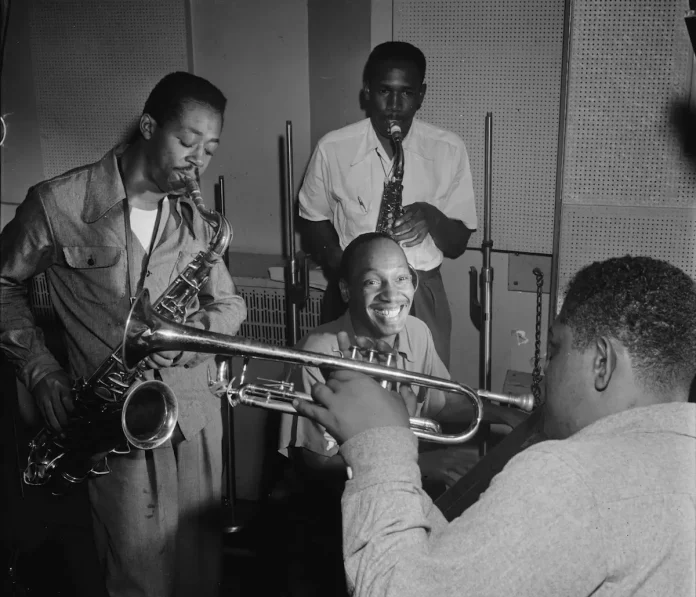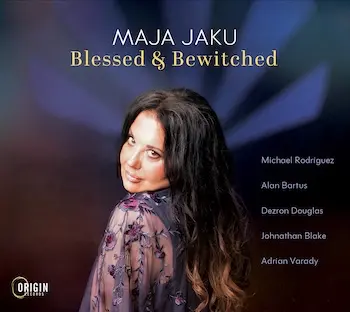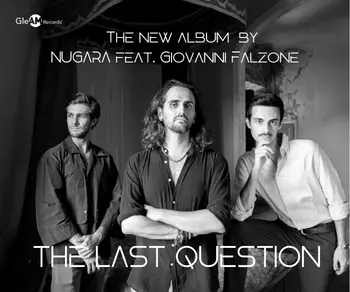Alister Spence Trio: Gather (Alister Spence Music ASM016)
There’s no justice in the world of the arts, nor in any other world – if there were, this self-produced album would be a bestseller, and Alister Spence would be a mega-star at least in the jazz and improv firmament. Gather features the pianist’s Sydney-based trio, with Lloyd Swanton (bassist with The Necks) and drummer Toby Hall (formerly with pianist Mike Nock). The trio was founded almost 30 years ago, and amazingly it’s been seven years since their last release, Not Everything But Enough.
I’ve written before that Spence couldn’t write an uninteresting composition, and still don’t think there’s much prospect. The eight pieces here are by him. He’s has long been recognised in Australia as one of the most original and distinctive pianist-composers. The coherence and imagination of his improvising matches his mastery of composition.
The album opens with The Gathering, with its memorable vamp and ringing theme that becomes ecstatic, resonant and gorgeous. Homeland has a long solo piano intro in rolling arpeggios; the composition itself is a plangent, rather lugubrious ballad, in which Hall switches from drums to glockenspiel. Crossed Over has a post-modal feel, while the grandiose, hymnic Beginning Of The End Of The Beginning has a haunting ad-lib tempo, its theme-statement and improvisation featuring prominent arco bass.
Falling From The Top Of The Sky has a sinuously compelling theme and delightful groove, while Moment Between is a haunting ballad composition. The driving tempo Antidote For Lean Times, with its coruscating theme and variations, produces an awesome affect. The track then moves into the freest territory of the album. This is a great pianist at the peak of his powers – an amazing album that richly repays repeated listening.
Keith Jarrett: New Vienna – At The Musicverein 2016 (ECM Records 7589792)
This ECM double-album marks the pianist’s 80th birthday earlier this year. It’s from his final European solo tour. Not long after, Jarrett suffered a stroke, then another, rendering him unable to perform. The title New Vienna reminds us that there’s an earlier Vienna release from 1992. New Vienna was recorded at the Golden Hall of the Musikverein – famous for premieres by Schoenberg, Berg and Webern. This is the fourth concert recording from Jarrett’s tour – after Munich 2016, Budapest Concert and Bordeaux Concert.
I am deeply puzzled by Jarrett’s decision to stop composing his wonderful originals and turn to the Standards Trio, plus solo free improv such as on New Vienna. It seems to be a commercial decision, following the embezzlement of his earnings by his manager. As a result, we have lost a treasure trove of compositions of the quality of Shades, Rainbow, and All That Lives Laments, which he wrote for his American quartet with Dewey Redman, Charlie Haden and Paul Motion – not to mention those he wrote for his European quartet with Jan Garbarek.
In his earlier solo concerts, Jarrett favoured long forms. In his late phase, he performed shorter pieces, and it’s true that several of those here are gems. Highlights include the funereal Part II; Part VIII is a blues, and Part IX is a characteristic Jarrett mix of gospel and country. Somewhere Over The Rainbow is a plangent encore. But the motoric Part I is tedious, and Part III, based on a minor key ostinato, is simply rebarbative. As has been said, Jarrett – like Schoenberg – is over-impressed with his own undoubted genius, and lacks a critical faculty.
I wonder why Jarrett thought that his free improvisations were superior to the songs he no longer wrote – because they mostly aren’t. Maybe the Köln concert turned his mind. Maybe, as my editor Mark Gilbert suggests, he succumbed to the Marsalis retro effect that swamped the jazz world from the early 80s. Or maybe, as Lewis Porter suggests, he felt “dried up” as a tune writer, and the loss of earnings was a convenient excuse. A bit of a mystery.
Charlie Rouse: Cinnamon Flower (Resonance Records HCD-2078)
Charlie Rouse (1924-1988) is best known as Thelonious Monk’s saxophonist, 1959-70. Rouse had a signature style, and his distinctive adenoidal tone enlivens some classic albums. He’s an acquired taste, maybe, and somewhat controversial as a partner to Monk, but I reckon he’s a thoughtful and, indeed, great musician. I recall his tour with Stan Tracey in the 80s – a wonderful partnership.
Rouse’s career began in the big bands of Billy Eckstine (1944), Dizzy Gillespie (1945), Duke Ellington (1949–50), and Count Basie (1950). He recorded with Tadd Dameron in 1947, worked with Clifford Brown in 1953 and Oscar Pettiford in 1955, and co-led the Jazz Modes, with French-horn player Julius Watkins, 1956-9. As Richard Cook commented, “Previously a typically fluent bop player, [he] meticulously adapted himself to Monk’s music: his tone became heavier, his phrasing more careful.”
Cinnamon Flower (Douglas Records, 1977) is from Rouse’s post-Monk period. Its Brazilian fusion aesthetic recalls his 1962 Blue Note album Bossa Nova Bacchanal. Personnel include trumpeter Claudio Roditi, pianists Albert Dailey and Dom Salvador, guitarists Ted Dunbar and George Davis, bassist Ron Carter and drummer Portinho. Producer Alan Douglas added instrumentation post-production – as he also did on posthumously released material by Jimi Hendrix. Cinnamon Flower is “sweetened” by such additional players as soul drummer Bernard Purdie, keyboardist Roger Powell on string synthesizer and trombonist Clifford Adams of Kool & the Gang.
The album is now reissued as a two-LP set, single-CD and digital download. This expanded edition features Douglas’s original release plus the album in its original form, without overdubbing – fortunately, the original engineer, George Klabin, kept the unaltered tapes, and Resonance Records is his label. On the opening track, Backwoods Echo, for instance, we can hear how Douglas reduced Rouse’s unaccompanied playing and added heavier percussion. Highlights for me include the vamp-based Clove And Cinnamon, and the beautifully lyrical Meeting House. For me the original, less produced version is superior – but let a hundred flowers bloom. The comparison is instructive, and it’s good to have both versions. A wonderfully melodic collection, highly recommended.




